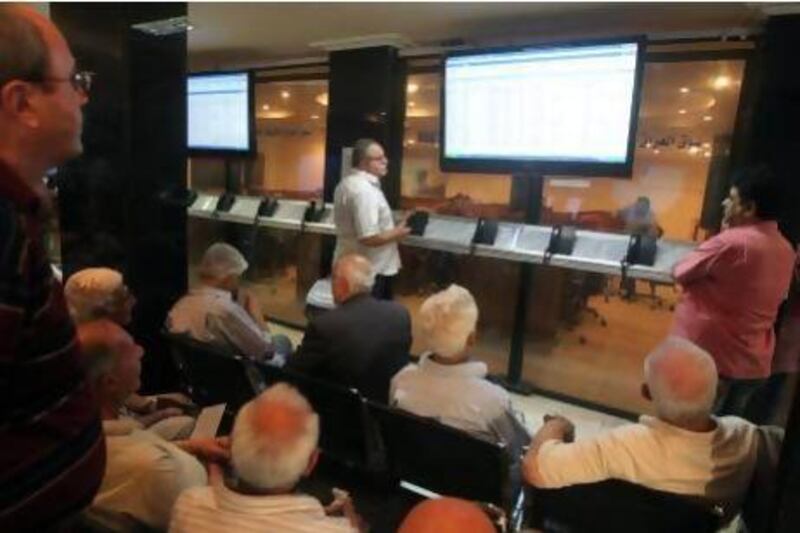The investment case for the Iraq Stock Exchange (ISX) has never been stronger. The IMF has reported that the Iraqi economy grew 10.2 per cent last year and expects growth to accelerate to 14.7 per cent this year.
Corporate earnings are growing rapidly as well.
In the banking sector, which accounted for about 80 per cent of the total year-end 2012 market capitalisation, net profit was up 83 per cent year-on-year in the first nine months of last year.
Yet investors from the GCC have generally remained on the sidelines. Reasons for this include the lack of third-party custody, a small market cap - only US$5billion (Dh18.36bn) at the end of last year - low average daily turnover ($5 million for December), and a limited choice of sectors.
Two recent developments, both particularly relevant to GCC investors, have the potential to resolve these issues and unlock significant foreign capital inflows.
The first is the listing of two majority Arabian Gulf-owned Iraqi telecoms companies.
The second is the awarding of Iraq's first custody licence to a Gulf banking group, a breakthrough that few were predicting even a few months ago and few are aware of even now.
The successful share offering of Asiacell Communications, majority owned by Qatar Telecom (Qtel), has almost doubled the exchange's market cap overnight and given equities investors exposure to Iraq's fast-growing and highly profitable telecoms sector for the first time.
Asiacell and its advisers, the Iraqi brokerage Rabee Securities and its affiliate Melak Iraq, have managed to pull off the biggest debut in the Middle East since 2008.
The offering, worth $1.24bn, was fully subscribed and the shares closed up 5.7 per cent on the first day of trading.
Seventy per cent of the shares were taken up by foreign investors.
The largest of these was the current majority shareholder Qtel, followed by high net worth individuals in the GCC and a handful of foreign investment funds.
The IPO is a requirement of the mobile companies' licences, all of which mandate that the companies offer 25 per cent of their shares to the public.
While forcing privately held firms to go public might seem a somewhat counter-intuitive method to develop a country's capital markets, in the case of Asiacell the strategy seems to have paid off.
This listing has also set an important precedent for Iraq's two other mobile phone companies - Zain Iraq and Korek Telecom - that are also required to offer their shares to the public. Zain is expected to list by June. Zain Group's existing GCC investor base and its high profile in the region are likely to increase this IPO's appeal to regional investors.
These listings have the potential to raise the total ISX market cap to more than $15bn, at last moving the exchange off the list of the world's smallest bourses. A clear path to this goal has now been forged.
The start of custody services is a second important step in this direction. Beginning this year, National Bank of Kuwait (NBK) has begun custodying Iraqi shares through its 80 per cent-held subsidiary Credit Bank of Iraq.
Custody has been a much-anticipated development for the Iraqi market because most of the larger institutional investors have mandates requiring their shares be held by custodians.
After hopes were dashed last year when HSBC cancelled its custody plans for Iraq, the provision of custodial services, even if not by the international franchise many were expecting, is an exciting breakthrough.
Credit Bank of Iraq received the licence at the end of last year and NBK's custody service "went live" last month.
So far, its main Iraqi business has been custodying shares from the Asiacell IPO but it is now set up to custody all the existing listed companies as well.
NBK is one of the top-rated banks in the region and Kuwait's largest bank, with $58bn in assets. It will undoubtedly be a satisfactory custodian for GCC investors and for many farther afield as well, particularly were it to enter into sub-custodian arrangements with global custodians.
With attractive mobile-phone companies coming to market, a custody solution finally at hand and a strong outlook for Iraqi GDP growth and corporate earnings, the ISX is now in a position to mobilise significant amounts of capital from GCC investors.
This is a welcome development both for Iraq and for the region.
Ali Albazzaz is an Iraqi investment manager. He specialises in Iraqi public equities and direct investments. Mark DeWeaver is a Washington-based economist and the author of Animal Spirits with Chinese Characteristics: Investment Booms and Busts in the World's Emerging Economic Giant





